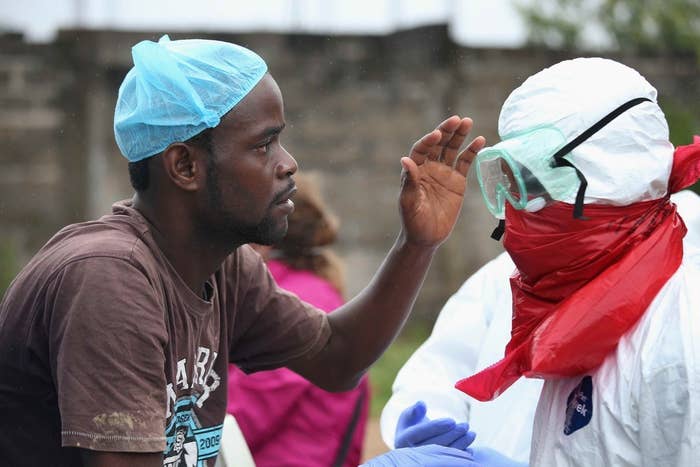
MONROVIA, Liberia — It takes five grown men to get Orusko A. Gar Gar's body into the back of the truck. He is in a thick black plastic bag with four wide handles, one at each corner. The men are other-worldly in bleach-white plastic suits, goggles, and red plastic bandanas wrapped around their noses and mouths, knotted tight beneath their white hoods.
These men are polyethylene pallbearers, slinging hands through handles, hoisting their uncooperative load, and swinging Gar Gar toward the industrial blue pickup truck.
Theirs may be the deadliest job on Earth right now. Ebola is at its most contagious in a human body when that body has just died.
Neighbors and relatives gather and watch, a cautious 15 feet or so away. One is Gar Gar's son, 28-year-old Prince, who knew he shouldn't touch his sick father's body. Another is Gar Gar's brother, D. Wheaye, who says he accompanied a health ministry decontamination team to spray the body four days earlier, on Wednesday, which is the day Gar Gar died. The team had protective gear, but the brother did not, and now he wonders if he could have gotten Ebola from that.
The body was sprayed where Gar Gar fell — right next to his bed, toes pointed directly upward — and it waited there for four days because the dead body management team doesn't come unless a test confirms the person had Ebola. There's only one lab that can do this in the country, and each test takes a full day to process. The lab, like the burial crews, gets backed up quickly.
Gar Gar's head hits the truck bed first, and it sounds like a small boulder crushing a tin shack. The rest of his body clunks arrhythmically, and someone drags him toward the cab. This truck could fit another dozen or so bodies like his — and that's just what it will do, when next it collects the previous night's dead from the Ebola isolation facility at the nearby ELWA hospital.
Ebola is a rapid killer — symptoms show within three weeks, but most people here say their family members are dead within days, sometimes hours. It's the clinical last rites of its victims that take time.
Korvayan and his team need around 15 minutes to suit up and spray themselves with chlorine, which kills the virus, and another 15 minutes to strip down. They do this for every body they retrieve, and in between, there's bagging the body and maneuvering it out. Don't trip. Don't drop him. Don't catch the plastic coffin on any jagged edges.
"I carried 16 [bodies] yesterday," Korvayan said. All four teams the Red Cross runs in Monrovia — they are the only group allowed to move the dead to burial or, more often, cremation — picked up 41. No one can remember now, as Ebola spikes in communities around the capital, if that's normal or not.
His crew is younger than him by two decades. But they're tired too. There is Yenti, who has a happy spirit, but this work could demoralize even the most sprightly soul. "It's common we see maggots," he said. "Sometimes the eyeballs are falling out of their heads. Or the tongue. The tongue falls out. And then I have to pick up his head, because you have to hold the head along with the feet and the body."
Yenti and the others make $1,500 a month, paid by the Red Cross — a fortune in impoverished Liberia, and more than seven times what one worker said the health ministry paid him during an earlier phase of the outbreak — but they agree that it's not enough.
How could it be? They are carrying a human cluster bomb — a corpse riddled with virus eager to spring out and find a new host. Ebola kills its victims by overwhelming them — too much virus, destroying too many cells too fast. And once it has killed its host, the virus sits in the flesh and the blood, dormant, waiting for new flesh, new blood to invade and reproduce.
The young crew says they're here because they want to help the country. "I want to protect my living Liberians," says one crew member. "Not the dead. They are gone. But the living." Improperly disposing of corpses — touching them, burying them without those plastic bags — is an easy way to spread the disease, and probably how Ebola moved from the rural north to the capital.
Still, he's not taking any chances. "I told my wife not to come near me until the work is over," he said. "But all my body hair is gone, man." He holds up skinny, bare forearms, smooth as a child's. "Burned away from chlorine."
Korvayan, the team leader, has been doing this job for four months. No vacation. No rest. Every day a work day. At 36, he's not as young as his teammates, and four months in, he's not as idealistic.
He's seen the outbreak swell, and the latest expert reports estimate that the Ebola crisis won't let up. It could be six months, Doctors Without Borders says, before it's under control.
If Ebola won't quit, in two weeks, at the end of August, Korvayan will.
"I just need to rest," he said.
